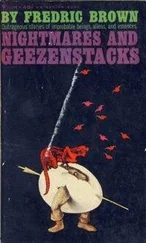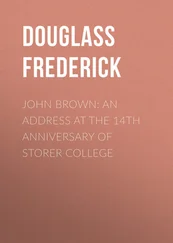Fredrick Brown - Night of the Jabberwock
Здесь есть возможность читать онлайн «Fredrick Brown - Night of the Jabberwock» весь текст электронной книги совершенно бесплатно (целиком полную версию без сокращений). В некоторых случаях можно слушать аудио, скачать через торрент в формате fb2 и присутствует краткое содержание. Жанр: Фэнтези, на английском языке. Описание произведения, (предисловие) а так же отзывы посетителей доступны на портале библиотеки ЛибКат.
- Название:Night of the Jabberwock
- Автор:
- Жанр:
- Год:неизвестен
- ISBN:нет данных
- Рейтинг книги:4 / 5. Голосов: 1
-
Избранное:Добавить в избранное
- Отзывы:
-
Ваша оценка:
- 80
- 1
- 2
- 3
- 4
- 5
Night of the Jabberwock: краткое содержание, описание и аннотация
Предлагаем к чтению аннотацию, описание, краткое содержание или предисловие (зависит от того, что написал сам автор книги «Night of the Jabberwock»). Если вы не нашли необходимую информацию о книге — напишите в комментариях, мы постараемся отыскать её.
Night of the Jabberwock — читать онлайн бесплатно полную книгу (весь текст) целиком
Ниже представлен текст книги, разбитый по страницам. Система сохранения места последней прочитанной страницы, позволяет с удобством читать онлайн бесплатно книгу «Night of the Jabberwock», без необходимости каждый раз заново искать на чём Вы остановились. Поставьте закладку, и сможете в любой момент перейти на страницу, на которой закончили чтение.
Интервал:
Закладка:
"Yes. You see, Doctor Stoeger, I was named forty years ago, when the name Yehudi, although uncommon, had not yet acquired the comic connotation which it has today. My parents did not guess that the name would become a joke — and that it would be particularly ridiculous when combined with Smith. Had they guessed the difficulty I now have in convincing people that I'm not kidding them when I tell them my name—" He laughed ruefully. "I always carry cards."
He handed me one. It read:
Yehudi Smith
There was no address, no other information. Just the same, I wanted to keep that card, so I stuck it in my pocket instead of handing it back.
He said, "People are named Yehudi, you know. There's Yehudi Menuhin, the violinist. And there's—"
"Stop, please," I interrupted. "You're making it plausible. I liked it better the other way."
He smiled. "Then I haven't misjudged you, Doctor. Have you ever heard of the Vorpal Blades?"
"Plural? No. Of course, in Jabberwocky:
One, two! One, two! And through and through
The vorpal blade went snicker-snack.
But — Good God! Why are we talking about vorpal blades through a doorway? Come on in. I've got a bottle, and I hope and presume that it would be ridiculous to ask a man who talks about vorpal blades whether or not he drinks."
I stepped back and he came in. "Sit anywhere," I told him. "I'll get another glass. Want either a mix or a chaser?"
He shook his head, and I went out into the kitchen and got another glass. I came in, filled it and handed it to him. He'd already made himself comfortable in the overstuffed chair.
I sat back down on the sofa and lifted my glass toward him. I said, "No doubt about a toast for this one. To Charles Lutwidge Dodgson, known, when in Wonderland, as Lewis Carroll."
He said, quietly, "Are you sure, Doctor?"
"Sure of what?"
"Of your phraseology in that toast. I'd word it: To Lewis Carroll, who masqueraded under the alleged identity of Charles Lutwidge Dodgson, the gentle don of Oxford."
I felt vaguely disappointed. Was this going to be another, and even more ridiculous, Bacon-was-Shakespeare deal? Historically, there couldn't be any possible doubt that the Reverend Dodgson, writing under the name Lewis Carroll, had created Alice in Wonderland and its sequel.
But the main point, for the moment, was, to get the drink drunk. So I said solemnly, "To avoid all difficulties, factual or semantic, Mr. Smith, let's drink to the author of the Alice books."
He inclined his head with solemnity equal to my own, then tilted it back and downed his drink. I was a little late in downing mine because of my surprise at, and admiration for, his manner of drinking. I'd never seen anything quite like it. The glass had stopped, quite suddenly, a good three inches from his mouth. And the whisky had kept on going and not a drop of it had been lost. I've seen people toss down a shot before, but never with such casual precision and from so great a distance.
I drank my own in a more prosaic manner, but I resolved. to try his system sometime — in private and with a towel or handkerchief ready at hand.
I refilled our glasses and then said, "And now what? Do we argue the identity of Lewis Carroll?"
"Let's start back of that," he said. "In fact, let's put it aside until I can offer you definite proof of what we believe — rather, of what we are certain."
"We?"
"The Vorpal Blades. An organization. A very small organization, I should add."
"Of admirers of Lewis Carroll?"
He leaned forward. "Yes, of course. Any man who is both literate and imaginative is an admirer of Lewis Carroll. But — much more than that. We have a secret. A quite esoteric one."
"Concerning the identity of Lewis Carroll? You mean that you believe — the way some people believe, or used to believe, that the plays of Shakespeare were written by Francis Bacon — that someone other than Charles Lutwidge Dodgson wrote the Alice books?"
I hoped he'd say no.
He said, "No. We believe that Dodgson himself — How much do you know of him, Doctor?"
"He was born in eighteen thirty-two," I said, "and died just before the turn of the century — in either ninety-eight or nine. He was an Oxford don, a mathematician. He wrote several treatises on mathematics. He liked — and created — acrostics and other puzzles and problems. He never married but he was very fond of children, and his best writing was done for them. At least he thought he was writing only for children; actually, Alice in Wonderland and Alice Through the Looking-Glass, while having plenty of appeal for children, are adult literature, and great literature. Shall I go on?"
"By all means."
"He was also capable of — and perpetrated — some almost incredibly bad writing. There ought to be a law against the printing of volumes of The Complete Works of Lewis Carroll. He should be remembered for the great things he wrote, and the bad ones interred with his bones. Although I'll admit that even the bad things have occasional touches of brilliance. There are moments in Sylvie and Bruno that are almost worth reading through the thousands of dull words to reach. And there are occasional good lines or stanzas in even the worst poems. Take the first three lines of The Palace of Humbug:
I dreamt I dwelt in marble halls,
And each damp thing that creeps and crawls
Went wobble-wobble on the walls.
"Of course he should have stopped there instead of adding fifteen or twenty bad triads. But `Went wobble-wobble on the walls' is marvelous."
He nodded. "Let's drink to it."
We drank to it.
He said, "Go on."
"No," I said. "I'm just realizing that I could easily go on for hours. I can quote every line of verse in the Alice books and most of The Hunting of the Snark. But, I both hope and presume, you didn't come here to listen to me lecture on Lewis Carroll. My information about him is fairly thorough, but quite orthodox. I judge that yours isn't, and I want to hear it."
I refilled our glasses.
He nodded slowly: "Quite right, Doctor. My — I should say our — information is extremely unorthodox. I think you have the background and the type of mind to understand it, and to believe it when you have seen proof. To a more ordinary mind, it would seem sheer fantasy."
It was getting better by the minute. I said, "Don't stop now."
"Very well. But before I go any farther, I must warn you, of something, Doctor. It is also very dangerous information to have. I do not speak lightly or metaphorically. I mean that there is serious danger, deadly danger."
"That," I said, "is wonderful."
He sat there and toyed with his glass — still with the third drink in it — and didn't look at me. I studied his face. It was an interesting face. That long, thin, pointed nose, so incongruous to his build that it might have been false — a veritable Cyrano de Bergerac of a nose. And now that he was in the light, I could see that there were deep laughter-lines around his generous mouth. At first I would have guessed his age at thirty instead of the forty he claimed to be; now, studying his face closely, I could see that he had not exaggerated his age. One would have to laugh a long time to etch lines like those.
But he wasn't laughing now. He looked deadly serious, and he didn't look crazy. But he said something that sounded crazy.
He said, "Doctor, has it ever occurred to you that — that the fantasies of Lewis Carroll are not fantasies at all?"
"Do you mean," I asked, "in the sense that fantasy is often nearer to fundamental truth than is would-be realistic fiction?"
"No. I mean that they are literally, actually true. That they are not fiction at all, that they are reporting."
I stared at him. "If you think that, then who — or what — do you think Lewis Carroll was?"
Читать дальшеИнтервал:
Закладка:
Похожие книги на «Night of the Jabberwock»
Представляем Вашему вниманию похожие книги на «Night of the Jabberwock» списком для выбора. Мы отобрали схожую по названию и смыслу литературу в надежде предоставить читателям больше вариантов отыскать новые, интересные, ещё непрочитанные произведения.
Обсуждение, отзывы о книге «Night of the Jabberwock» и просто собственные мнения читателей. Оставьте ваши комментарии, напишите, что Вы думаете о произведении, его смысле или главных героях. Укажите что конкретно понравилось, а что нет, и почему Вы так считаете.












